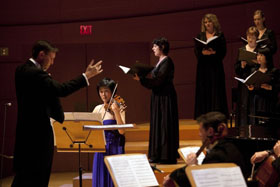The Los Angeles Times
March 7, 2011
original
link
Music review: L.A. Master Chorale sings 'Stories from Korea'
“Check out the beautiful concert hall and grab some tacos,” tweeted kogibbq, the Korean barbeque food truck, late Sunday afternoon. News was that the Cheasy Weasy (grilled cheese, bananas, peanut butter, Thai chili sauce) is back. The story of Korean fusion food is one that just about everyone in L.A. tends to know.
The Kogi truck was parked on 1st Street in front of Walt Disney Concert Hall to add a Korean culinary patina (long lines suggesting a welcome break from pricy Patina concert hall fare). The program was the Los Angeles Master Chorale's “Stories of Korea.” These are the stories, musical and political, many in L.A. tend not to know.

Violinist Jennifer Koh and conductor Grant Gershon
in the Los Angeles Master Chorale's world premiere of
Mark Grey's "Mugunghwa" at Walt Disney Concert Hall
Sunday night. Credit: Allen J. Schaben/Los Angeles Times.
The main event was the premiere of Mark Grey’s “Mugunghwa: Rose of Sharon,” an impressive major work for chorus, violin soloist Jennifer Koh and chamber ensemble. The texts are from poetically haunting and harrowing journals by an unnamed Korean electrical engineer from the north who escaped south during the Korean War and was then conscripted by the South Koreans to fight against his relatives. The context is the breakup of families, the Korean diaspora (musical and personal) and the fusion of East and West in Korean culture. Big stories, all of them.
To set the scene, music director Grant Gershon began with short contemporary pieces that exemplify a flourishing of choral music scene in Korea. Much of that, though, is influenced by a not-always-helpful Western example.
The program note mentioned that in traditional Korean music, a master singer "needs to show blood coming out one's mouth." Christian missionaries in the late 19th century came armed with pallid Palestrina, the Roman Renaissance composer, and the liturgical like.
These days old and new styles, centering on folk or church sources, fuse in various ways. The most interesting of the opening pieces was “Me-Na-Ri” by Hyowon Woo and based on a folk song, “Arirang,” which unites all Koreans. With chorus members spread through the hall and Korean percussion on stage, the sound marvelously enveloped the audience.
Grey is an American with an international perspective. An ingenious sound technician (who works with John Adams and has collaborated with Peter Sellars), he has been making a name in his own right as a composer of ambitious projects, including the “Enemy Slayer,” a 70-minute “Navaho Oratorio” that the Phoenix Symphony premiered three years ago.
The texts for “Mugunghwa” were discovered in the family papers of a friend of Grey’s and include the journals of the electrical engineer, given the pseudonym Namsoo Kim, who ultimately immigrated to Canada, and letters from his sister in North Korea. The title is the national flower that, Grey writes in a program note, “geographically unifies the Korean peninsula.”
There are many levels to this 45-minute score, which is its own unique fusion of oratorio, violin concerto and shamanistic rite. The engineer’s saga is framed by “The Ritual Song of the Bridge,” a shamanistic song meant to symbolize bridges between the Koreas, and between earth and paradise. Korean and English intermingle in the texts.
The violin has a spiritualist role as a bravura one, Koh was here a model of power virtuoso and soaring shaman. She was kept busy much of the time, as was an ensemble of winds, four cellos and piano. And, of course, the chorus. Grey is never short of ideas.
His style is broadly (very broadly) post-minimal, and it is not surprising to hear the influence of Adams’ harmonic language. But Grey’s voice is singular and he has found an intricate method with which to incorporate Korean melodic and rhythmic elements into a moody sonic and poetic atmosphere, to tell a story and to keep the listener in a pleasant state of suspended animation.
Eventually threads do come graciously together for a blissful final vision. But the threads –- musical and mystical, personal and political -– are perfectly entrancing on their own. The performance was compelling and the 45 minutes seemed to go by very fast, almost too fast.
Unlike a Kogi Cheasy Weasy, one sampling of “Mugunghwa” is not enough.
Copyright ©2011 The Los Angeles Times
© Jennifer Koh, All Rights Reserved. Photography by Juergen Frank. Site by ycArt design studio